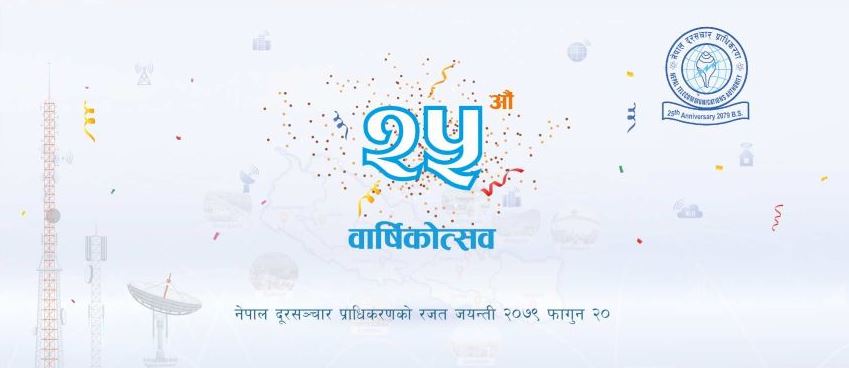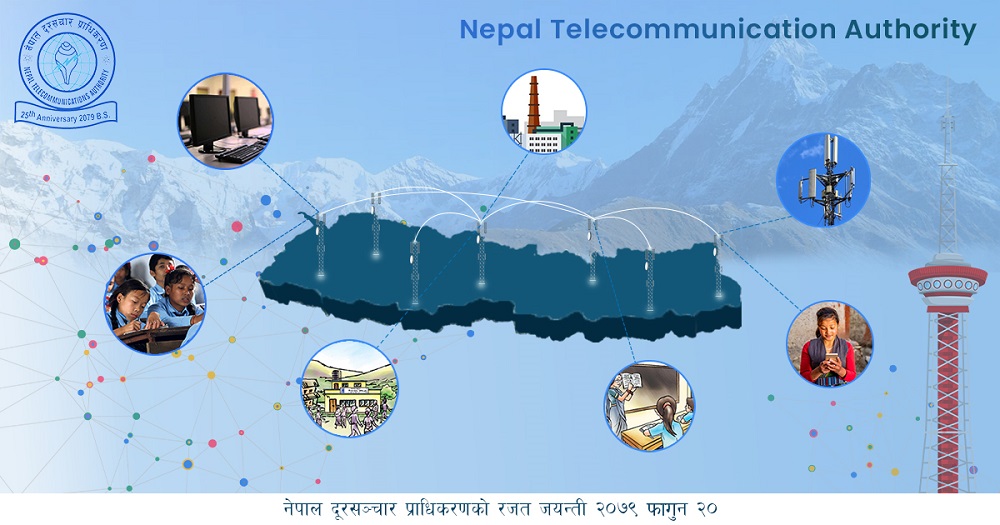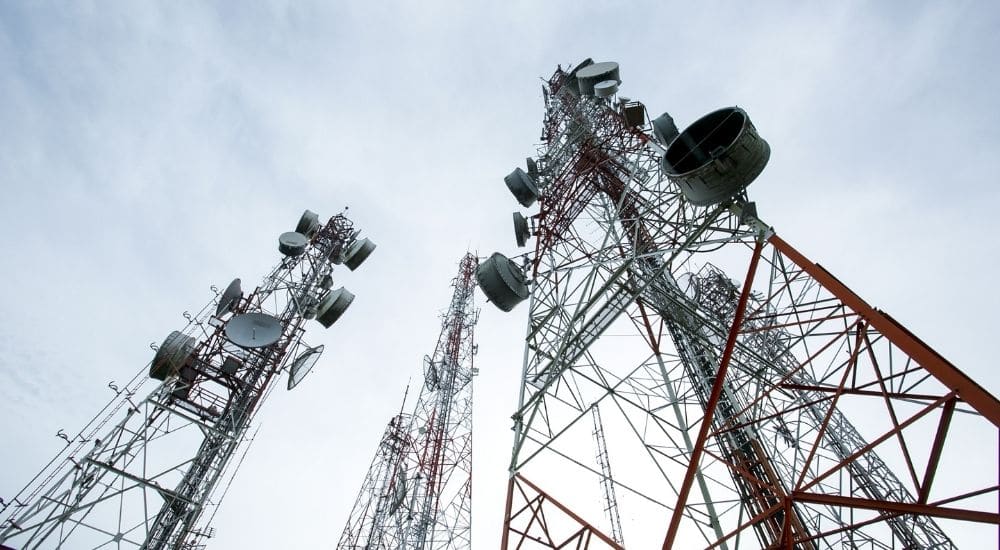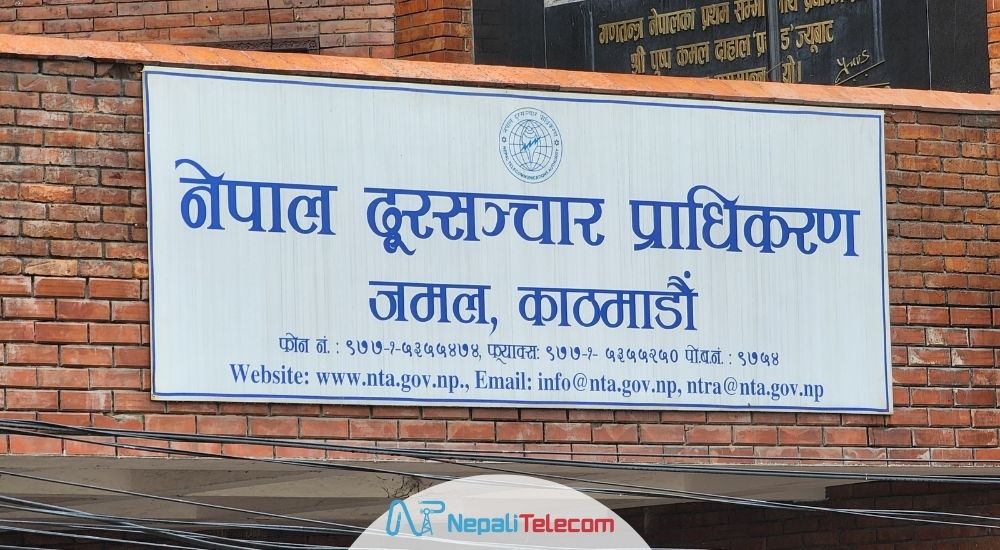Telecom regulator Nepal Telecommunication Authority (NTA) celebrated its silver jubilee (25th anniversary) on Falgun 20, 2079 BS. As it begins its 26th year in service, the authority has extended its gratitude to the Government of Nepal, customers, NTA officials, employees, service providers, and all the ICT-related organizations for continuous guidance, and support. In its notice, it said that Nepal’s progress in telecommunication is in a satisfactory state and expressed its commitment to continue working on ensuring better service for customers.
NTA was established on Falgun 20, 2054 with an aim to make telecom services reliable and affordable, involve private entities in the industry, and make services regulated and organized. NTA says that the telecommunication industry has been successful since its establishment. The current status of telecommunication development in Nepal can be considered satisfactory, it said in its statement.
In voice service, there are 2.80 percent fixed telephone subscribers across the country. Likewise, mobile telephone density has reached 126.02 percent taking into consideration SIM card sales and 0.01 percent of other services totaling 128.83 percent density. In broadband service, 36.18 percent of Nepalese have subscribed to fixed broadband (wireless and wired) internet while 95.26 percent are using mobile broadband. That is, the total broadband reach of Nepal now stands at 131.45 percent.
On broadband expansion in rural areas
NTA plays an active role in expanding broadband coverage in rural areas. The authority uses Rural Telecommunication Development Fund (RTDF) to establish internet services in local bodies. It says that 708 local bodies have received free broadband service with this initiative. Likewise, previously deprived 5,933 ward offices, 5,318 community schools, and 4,249 health organizations, altogether 16,208 separate local institutions have now received broadband services from NTA.
Also read: Ntc 4G Coverage Reaches 98 Percent in Local Levels, Over 96 Percent Sites On-aired

However, it says, many rural and remote areas in Nepal don’t have reliable telecom services. The authority says it acknowledges the condition and stays committed to expanding and improving telecom services in such unconnected or poorly connected areas. Besides, it also has been building infrastructures as per the Digital Nepal Framework to create a foundation for Digital Nepal.
Check out: Compensation to customers for poor internet, to implement New telecom service quality bylaw
Cyber crimes a challenge for both the country and societies
NTA also mentions that the development and expansion of modern telecom services have led to an increase in many social and financial crimes. This topic has emerged as a challenge for the country and society. It is necessary to keep people informed by law and institutions to minimize cybercrimes. Infrastructure sharing and unilateral coordination between concerned bodies to manage telecom infrastructure, cables, manage e-waste. The authority also mentions that protecting customer right as per the quality bylaw is today’s requirement.
On the special occasion of its silver jubilee, NTA says, it is necessary to immediately facilitate service providers’ role to expand services in unconnected areas. It says the authority is committed to implementing service tariffs as per the purchasing power of the customers, making the provision of quality services as per the regulation more effective, making arrangements to address customers’ complaints, etc.
Likewise, it will remain more active in making timely revisions to bring in domestic and foreign investment into the industry, create conditions where all the citizens could benefit from innovative technologies, and make the telecom sector more developed and organized.
Check out: All the details about NTA Mobile Device Management System (MDMS) in Nepal
Action against those responsible for causing damage to telecom infrastructures
Speaking on the occasion of the authority’s silver jubilee, chairman Purushottam Khanal demanded that the government bring the responsible into law for causing damage to telecom infrastructure. He reminded the MoCIT minister Ms. Rekha Sharma that the instances of harming the telco equipment are growing and requested her to take necessary measures to contain it.
At present days, those who have been directly or indirectly involved in affecting telecom infrastructure must be punished as permitted within the scope of the law. Additionally, there are increasing cases of damage on telco infra during road construction and pole relocation works. If it’s not addressed timely, the government faces the risk of service disruption in its ICT-related important activities.
Recently, Ntc and Ncell both suffered network outages after their infrastructures faced damage from road construction works. Both the telcos have called for coordination to avert such network outages in the future.
Read: Causes of Mobile & Internet Network Outage And What You Should Do?
On NTA facing difficulty in being fully autonomous
Mr. Khanal also touched on the issue of the authority not being completely autonomous. He said that the authority was imagined as per the concept of liberalism in cooperation with the World Bank. However, he remarked that Nepal’s political leaders and bureaucrats can’t entertain the word autonomy.
Theirs is a sentiment that a body can’t be above a ministry (MoCIT). He also talked of telcos’ discrepancies with its ruling. Ntc won’t comply with some of our regulations while Ncell will adhere to them. But that is not because the authority is ineffective, but because the operators bypass it and go to the Ministry.
Don’t miss: Telecom development in Nepal in 2022 | 4G, Fiber, eSIM, 5G Preparation
On the search for a true third telecom company
Mr. Khanal doesn’t hesitate to admit that there’s a need for a third telecom operator in Nepal. For the competition, if there’s just one company, it’s called a monopoly, if there’re two, it’s a duopoly. But the competition starts only with the arrival of a true third telecom operator in Nepal. At the moment, there’s one state-backed and the other private telco with different natures of operations which is not allowing for proper competition in the telecom industry. That is why there’s a need for a third telco.
He weighed in on the heresy that NTA could give away spectrum influence politics. He said that companies will need to follow the prevailing regulation to obtain a license. The supremo said, “Having capital is not a guarantee for license approval. The necessary processes need to be in place. If any third company had arrived 10 years ago following all the procedures, it would have received the license. But that didn’t happen”. However, he also admitted that “the law is old and some conditions may be not pragmatic in today’s times. So, the regulator could be considerate of this. But the authority that is made to enforce the law would violate the law”.
Do read: NTA passes regulations for Telecom companies merger in Nepal
Since the law is old, some conditions may not be practical. For this, the regulator could give some space. But there would be no situations where an organization that is supposed to follow the law would violate the law.
NepaliTelecom extends its heartiest congratulations to NTA on achieving its 25th anniversary and wishes that it continues to play an effective role in uplifting Nepal’s telecommunication industry for everyone’s benefit.
What would be your most worthy demand from NTA? Strict regulation on service providers to ensure better quality services, lowering the costs, or service expansion? Do offer your input in the comments below.












